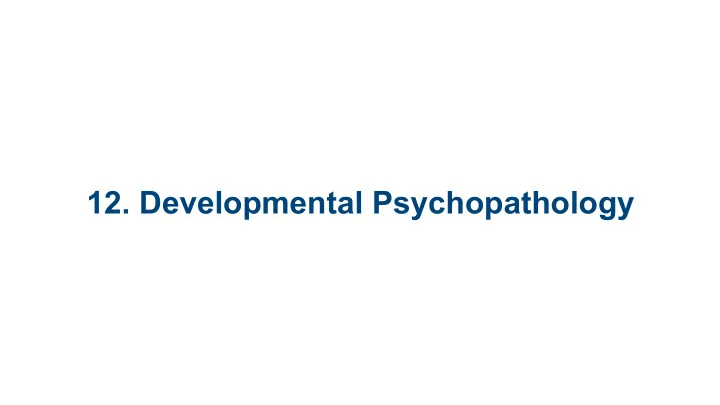

12. Developmental Psychopathology
12.1 Chronic Illnesses and Physical Disabilities 12.2 Intellectual Disability 12.3 Cognitive Disorders, Including Dementia
12.4 Trauma-Based Syndromes 12.5 Autism Spectrum Disorders 12.6 Attention Deficit/ Hyperactivity Disorders
12.7 Learning Disabilities 12.8 Asocial Behavior, Phobias, and Obsessions
12.9 Antisocial Behavior 12.10 Anxiety and Mood Disorders
12.1 Chronic Illnesses and Physical Disabilities
Chronic illness • Long-term condition affecting development • Asthma • Arthritis • Diabetes • Cardiovascular disease • Cancers
Chronic illness • Influenced by lifestyle, SES, genetics
Physical disability Long-term impairment • Prenatal (teratogens, etc.) • Perinatal (complications at birth, premature delivery) • Post-natal (accident, infection, illness)
Types of impairments • Visual • Hearing • Mobility • Physical defects • Organ/structural damage
12.2 Intellectual Disability
Cognitive component • IQ under 70 Adaptive component • Daily function problems
Early symptoms • Delays in motor skills • Delays in speech • Self-help difficulties
12.3 Cognitive Disorders, Including Dementia
Cognitive dysfunction • Prenatal or brain injury • Types • Memory processing • Perception (e.g. dyslexia) • Problem solving • Language
Cognitive dysfunction • Oliver Sacks: “The Man Who Mistook His Wife for a Hat”
Dementia • Progressive memory loss, usually late adulthood
Dementia • Special case: Alzheimer’s starts with dementia, progresses to • Loss of self-identity and relationships • Wandering • Memory loss of object names and functions
12.4 Trauma-Based Syndromes
Psychological trauma • Natural disaster victims • Victims of hate, violence, war, abuse
Psychological trauma • Symptoms of PTSD • Re-experience by trigger • Anxiety/panics • Nightmares/insomnia • Detachment/”numbing” • Depression
12.5 Autism Spectrum Disorders
Autism • Range mild to severe • Unresponsive to people and social cues • Difficulty making eye contact
Autism • Other symptoms: • Obsessive interests • Compulsive repetitive behaviors
12.6 Attention Deficit/Hyperactivity Disorders
Attention-deficit/ hyperactivity (ADHD) • Distractible ➔ focus difficulty • Impulsive ➔ behavior difficulty • Fidgety ➔ needs to move • May show 1-2 symptoms • Learning disabilities likely
12.7 Learning Disabilities
Learning disabilities • Discovered in elementary grades • Subject-area difficulties • Reading/language • Writing/communication • Math (computing/ solving)
Learning disabilities • Emotional problems likely • Coping/compensation, not cure
12.8 Asocial Behavior, Phobias, and Obsessions
Can’t/won’t relate • Mild: introversion • Enjoy own mental self • Prefer solitude, not shy or lonely • Extreme: schizophrenia • Caught in delusions, not able to relate consistently
Can’t/won’t relate • In-between: personality disorders • May avoid social contact • May be uncomfortable in social settings • May be secretive or “cold”
Phobias • Fear that overwhelms • May cause panics (e.g. agoraphobia) • May cause fainting (e.g. blood phobia) • Begin middle childhood or adolescence • Females more affected
Obsessions (OCD) • Obsession: thoughts that don’t go away • Compulsion: behaviors that can’t be stopped • Example: “I am dirty” ➔ excessive handwashing • Example: “I am being watched” ➔ excessive checking doors, windows
12.9 Antisocial Behavior
Mad at the world • Aggression, vandalism, racism, sexism • Oppositional Defiant Disorder (ODD) • Angry, resentful • Argumentative, defy rules/authority • Blames others
12.10 Anxiety and Mood Disorders
Anxiety • Feeling of worry, dread, expecting something bad • Physical symptoms: tightness, fatigue
Anxiety • Types • Existential/crisis • Performance/test • Social/stranger • Choice/decision
Mood disorders • Depression: sadness, sleep excess, comfort eating, feel rejected • Bipolar disorder: cycles of high and low mood/energy • Substance-induced, e.g. stimulants, alcohol leading to depression
Recommend
More recommend